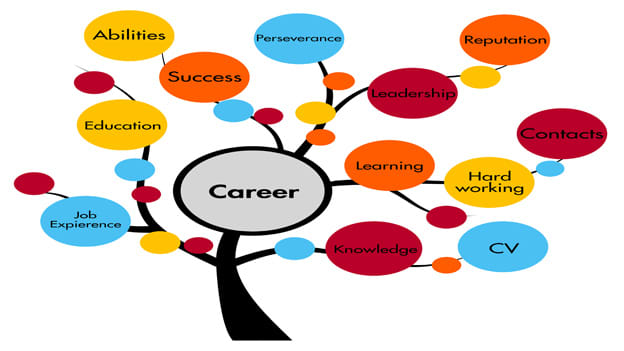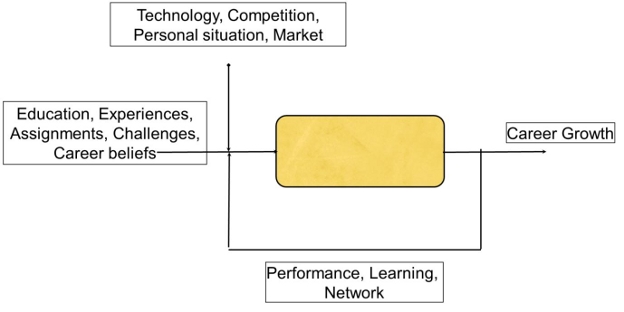3 tips to keep tabs on career growth

Career moves are neither purely accidental nor always planned. It is always a mix of a ‘guided tour’ and an ‘adventure trek’
It’s our “reputation capital” which helps us to grow in our careers. Reputation is built by consistent performance and walking the talk and not by trying to be popular or focusing on “image”
Here’s a story worth reading: This person lost his job and was defeated in elections for the legislature the same year. A few years later, he had a nervous breakdown. He got elected to the Congress, but lost his re-nomination. When he stood for Senate, he was defeated again but got elected as the President of the United States of America. He went on to become the most famous US President, someone who changed the course of history that shaped the destiny and identity of America. His name, if you have not already guessed, is Abraham Lincoln!
Strangely, the ‘career growth’ Lincoln experienced does not seem to fit the pattern we hear in corporate trainings and read about in self-help books! Most advice goes like this: To achieve vertical growth in one’s career, one needs to have a solid plan. Then one must choose assignments that fit their long-term objectives. One also needs a strong sponsor to take care of one’s growth, a sort of benevolent uncle in the business who is near the top in the organization. The free (and paid) advice on the web also re-enforces this and goes even further in terms of advice on the types of clothes to wear (sharp for men, modest, business-like for women), rehearsing a small piece of oratory (elevator pitch) just in case one meets a VP in the lift.
There are reasons why this career advice industry is growing rapidly. With average life spans increasing across the globe, career has become a very relevant topic at all stages of life. With the talent war heating up, studies show that 40 per cent of employees leave the company for better career opportunities. However, a lot of this canned advice seems to run counter to our everyday experience. In a career journey, one can make all the plans one wants, but frequently we are not in a position to choose specific assignments. One may not get selected to start with, the nature of assignment might change after you take it up, or other constraints might crop up such as family, health etc.
The same thing goes about having a sponsor and role of a chance meeting to land a good assignment. However in today’s highly-matrixed and large global organizations, career should be understood in its correct sense as a progress, encompassing aspects of life, learning and work. The traditional mental picture of a ladder is not the most appropriate one to describe career. One way to do it would be using what is called “system analysis” in engineering. At a very basic level it would look like this:

But we can immediately see that some elements are missing. First of all, it is far too simplistic. In reality, the output influences the input! The part of the output that loops back to influence the inputs include things such as performance history, networks you have built, transferrable skills acquired over a period of time, learnings from successes and failures and even career beliefs acquired over a period of time. Michael Jordan, one of the most successful basketball players of all time has said “I’ve missed more than 9,000 shots in my career. I’ve failed over and over and over again in my life. And that is why I succeed.” As we can see, somehow the failures ‘fed’ his subsequent successes.
The picture now looks like this:

Fig 2: Systems model of Career Growth
Apart from this there are always extraneous factors such as external market environment, change of management, personal life events such as illness, life events etc. The presence of people and external variables makes everything less predictable. There’s a Greek saying that you cannot dip your foot in the same river twice. Things change and are in flux. Computerization, internet and mobile telephony have radically altered many fields ranging from online marketing to how companies identify and recruit talent.
Figuring out how to grow the career depends on how the output is defined. Is it the next role or promotion or higher responsibility or job satisfaction or even money? The answer may be a very different combination of these and other factors for different people. And therefore the same system may look as fair and might seem like an unappreciative and hard place to others.
Career moves are neither purely accidental nor always planned. It is always a mix of a ‘guided tour’ and an ‘adventure trek’. Here are a few factors we have observed closely for many of the people whose careers we have seen flourish or perish.
As in your life, it is important to enjoy what you do and stay focused on the current job. Great Chinese thinker Confucius said, “Choose a job you love, and you will never have to work a day in your life.” Just as in our life one has many influences, role models, mentors and characters that mold us, no one person makes up “the system” during a career. It helps to take advice from experienced leaders and peers. At the same time, remember that it is their view of how the “system” works or should work. In the end, the sum total of experiences matters more than the end.
Relationships: In this networked world, it is also important to create a strong network of supporters. It’s not the number of people we know, but how well we know them that matters. Relationships, like all good investments, need effort. It is these “invested relationships” that may help you when you are at cross-roads and need help.
Situational awareness: It is not enough to keep an eye on one or two instruments (current assignment, appraisal) while navigating through one’s career, but focus on other things (e.g. are the assignments adding value, is your industry faring well, Are there people who will speak for you when you are not in the room ) as well. When the world economies went down in 2008-09, some people like Dean Baker, Med Jones, Dr Nouriel Roubini predicted that something is wrong, while most of the world refused to acknowledge. A career has many variables. One should be able to focus on each of them independently and also understand the impact of their combinations.
Finally, in every role, we leave behind an impression. It’s our legacy and it contributes to our personal brand. “Reputation Capital” (ref: The 2020 Workplace). It’s our “reputation capital” which helps us to grow in our careers. In other words, evaluate and take more risks and bet on significant opportunities, take the ‘road less travelled’, but do not forget the map and the compass. The critical point is “reputation” is built by consistent performance and walking the talk and not by trying to be popular or focusing on “image”.
Each one of us has a life story, though not necessarily as lofty or dramatic like that of Abraham Lincoln. Our successes and failures are tied to our story. We must own our actions and focus on learning from experiences whether good or bad. While every success should be celebrated, every failure should be owned. It teaches us a way which does not work, hence strengthening us to be better in future. As Jack Welch once said “Control your destiny or someone else will”.








